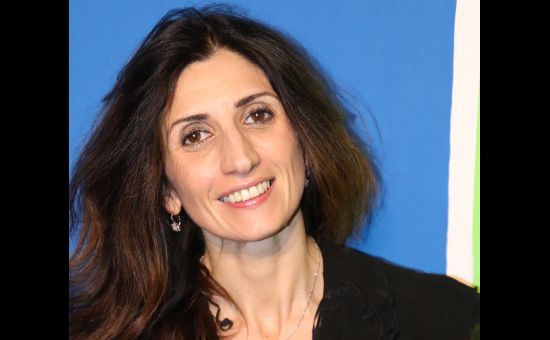
5 Minutes with… Mariarosa Cutillo

To say Mariarosa Cutillo is impressive is an understatement. She’s been the corporate social responsibility manager for Benetton Group and CEO of Benetton’s UNHate Foundation for years; she lectures on international law at University of Milan-Bicocca and the Catholic University of Milan; she’s worked extensively in the field with NGOs; she’s an expert in brands and CSR, having published several scientific and educational articles on the subject. Oh. And she’s taken a new role with the United Nations. As Head of Strategic Partnerships at the UN Population Fund, she’ll be able to put all her expertise and experience to good use, on a global level, pushing brands to see CSR as more than just feel-good marketing. LBB’s Laura Swinton caught up with her to find out more about her new post and to learn why brands need to realise why ‘straightforward philanthropy is over’.
LBB> You originally studied International Law and have a post graduate specialisation in Human Rights – it seems you’ve always had a desire to fight for the disenfranchised. Where do you think this drive originates from?
MC> Maybe it is a natural predisposition but my professor of International Law at the Catholic University was really a tremendous inspiration: from the first time I attended his lesson I said I wanted to learn and study human rights and that I wanted to become his assistant. I did so, learning from him but not only this. I also needed to see human rights in practice and so this is why I left for Bangladesh, in 1996, where I started to work in projects for the Dalits, the outcaste.
Then one thing led to another. But I can say one thing for sure: I’m privileged to have seen theory in practice (or unfortunately not) from several perspectives. This enormously enriched me.
LBB> When and how did you come to the realisation that you wanted to combine your passion and expertise in justice and human rights with business?
MC> After coordinating the Global March against Child Labour for Europe from the late nineties and after working for several projects in the field that had to do with the first ideas of CSR in those years in India and Bangladesh. Furthermore I realized I didn’t only want to work from the outside, through NGOs, but inside the business itself. I learnt a lot from this process.
LBB> Your new role with the United Nations Population Fund sounds incredible. How did it come about?
MC> The UN is increasingly looking at the competences of stakeholders outside the organization: I had several these competencies and so I was, let’s say, the right person at the right moment for the organization.
LBB> As chief of strategic partnerships at UN Population Fund, what will your main responsibilities be?
MC> To build innovative partnerships and engage different stakeholders to support the mission and the projects of the organization. This will mean building platforms to support women and youth.
LBB> And what is your personal vision for this role?
MC> I see it as exciting, the idea of engaging different stakeholders, coming from different backgrounds and languages to build innovative partnerships intrigues me. It will involve building networks to empower and support the organization and this is something I am very interested in and potentially will find very satisfying.
LBB> How are you preparing for the move to New York?
MC> I am very hectic at the moment and think I’ll struggle to be ready in time for my departure, but I’ll manage. I need to try and wrap up things and spend as much time as possible with my family who will come out to join me in July.
LBB> At Benetton and the UnHate Foundation, you worked for a brand that takes its social and environmental responsibilities seriously – I think it’s fair to say that not all brands have such a profound commitment! How can brands move beyond superficial CSR lip service and embed these values/causes into their culture?
MC> Companies need to realise that CSR is not a trend, but it is core to their business and must be part of the day by day work. This is easy to say but requires dedicated, passionate, constant work and dialogue every day at all levels, plus a commitment that states clearly internally and externally, at the highest level that this is not an option for the business but mandatory.
LBB> You’re president and CEO of Benetton’s UNHate Foundation – I’m fascinated by the foundation’s blend of creative comms and concrete community initiatives to achieve its goals. Which UnHate projects are you personally proudest of and why?
MC> I am proud of all of them, but I would say that the Unemployee of the year project and campaign has a special place in my heart. In 2013 – in a year in which the international community was presented with a great warning about youth unemployment – we sent a positive message saying that young people’s aspirations must be supported, and they were not failing. We backed this up by financing 100 start ups – funding the aspirations of 100 young people under 30 from all over the world. We have exciting and brilliant projects as a result that were submitted to the foundation.
LBB> Last year Benetton launched the Women Empowerment project in conjunction with the UN, with the aim of ensuring fairly paid jobs in safe workplaces. How has the project progressed since its launch?
MC> The company is presently evaluating a number of projects and credible partners that have come to us since the launch. We have had several requests from different stakeholders and will soon come up with the first concrete project.
LBB> What was interesting is that Women Empowerment has a very tangible objective – so often you hear of grand social projects that have such abstract and difficult-to-pin down goals. What advice would you give to brands hoping to embark on a CSR project in terms of determining measurable and achievable goals?
MC> My first advice is to be coherent internally with what’s said outside and to make sure that these CSR projects are understood in the company at all levels and endorsed at the top. As the Special Representative of the UN on business and human rights has said, internal communication and buy-in is crucial to engage external stakeholders. So projects must bring about a tangible change in the day-to-day business and also have a wider impact on communities.
LBB> Oxfam recently issued a report claiming that the 62 richest people in the world have as much wealth as the entire poorer half of the world’s population. It shows that your work with Benetton and now at the UN is more relevant than ever. How can brands tackle the massive disparity between the wealth and profits they accrue for shareholders and the living conditions and economic power of their employees ?
MC> Well, first brands must realize – and also companies I would say – that the age of straightforward philanthropy is over. Businesses are agents in society and that they can contribute to bring about real change and make a positive impact in the community. Benetton has a 50 year track record of social engagement, but now more than ever, it is an example of how corporate and social responsibility is a core part of its business mission, and this social engagement needs to be embedded in all it operational business and behaviours.
This is an exciting challenge because it’s work which by definition has to be done with other stakeholders, so a company has to be able to listen and understand the language of the institutions, of civil society, consumers etc. This could lead to positive alliances that ultimately bring to a fairer distribution of wealth: I would say that now it is time to act, the Millennium Development Goals have been reframed into the Sustainable Development Goals and we can’t wait further.
LBB> Throughout your career, you’ve balanced working for NGOs and the private sector with an academic career. How has working as a professor and lecturer, working with students and carrying out research, helped inform how you approach your other roles?
MC> It helped me and helps me a lot: first because I have to keep on studying and being updated and I am very intrigued by several issues concerning International Law. I really need that because I have an inside need to grow, I am curious and I like to explore. This then allows me to be always on track with whatever I need to implement for the company (and before that NGO) where I work. Second, students are a continuous source of improvement, because they challenge you and you need to be able to hold their attention. T
It's something that can also be translated into day by day work in the company. I can say that I have a passion for teaching and I guess my students know that.
LBB> Who are your personal heroes and why?
MC: I have quite a few, but to name some:
Charles Lindbergh, for being first to fly over the Atlantic and saying that awareness trespasses senses and you can see much further the horizon without using the eyes. To say that with will, enthusiasm and passion, all is possible. Also Madame DeStael, a tremendously great woman, a revolutionary and intellectual catalyst.
LBB> Between your academic career and your Benetton work and various other roles and commitments, I’m guessing you don’t get a lot of time to yourself…. But when you do, what do you do for inspiration or relaxation?
MC> Well, first I try to stay with my children and husband as much as possible. They have been used to having a ‘travelling’ mum since when they were very little and … I am, of course, a supporter of quality of time with them. They are 15 and 17, so at a very tricky age: I am so proud of them – which may be obvious – and also I can see they’re very caring and sensitive about what happens in the world around them, and this is not obvious at all.. Otherwise I like meditation, going to the Gym, watching good movies (I am the greatest fan of Wes Anderson) and listening to music (favourite of all: The Smiths!).















